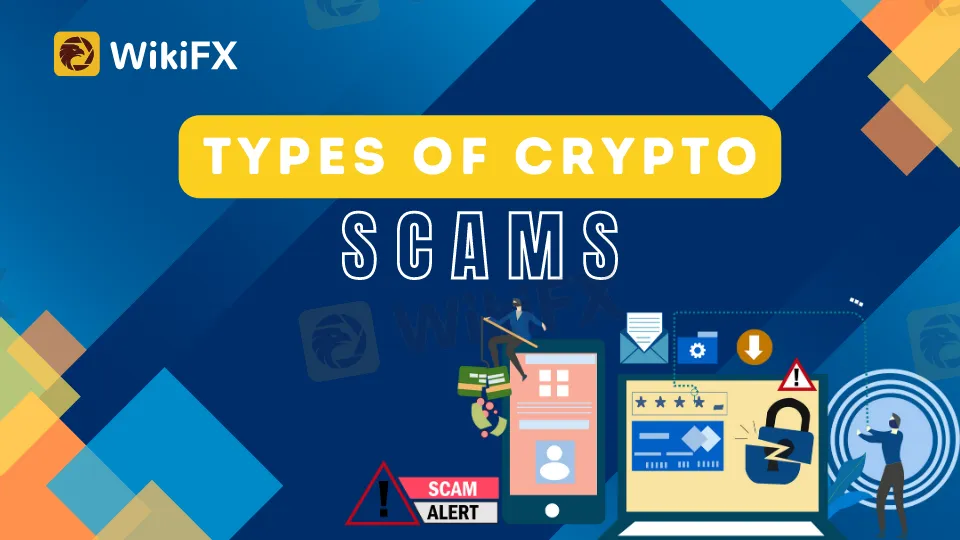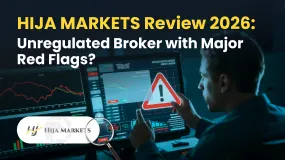Abstract:Explore common crypto scams, understand the difference between a crypto broker and exchange, and learn how to safeguard your investments.

Cryptocurrencies have expanded the financial world's horizons by providing a diverse range of investment alternatives. However, this inventive digital world is fraught with danger, particularly for individuals unfamiliar with its complexities. A lack of awareness often leads to falling victim to numerous crypto scams prevalent today. This article aims to enhance your understanding of the most common crypto scams and the difference between crypto brokers and exchanges. We'll also explore the chances of retrieving your money if you, unfortunately, fall for a scam.
List of all crypto scams and its definition
Understanding the different sorts of fraud is the first step in protecting your finances. The following are some of the most popular cryptocurrency scams:
Fake Giveaways: Scammers impersonate prominent figures or companies in the crypto world and falsely claim to give away free tokens in exchange for a small amount of cryptocurrency.
Ponzi and Pyramid Schemes: These scams operate by promising high returns to early investors using funds obtained from later participants.
Fake Exchanges or Wallets: These are fraudulent platforms that appear legitimate, aimed at stealing your login credentials and subsequently, your funds.
Phishing Scams: Here, scammers trick you into revealing your private keys or seed phrases, granting them access to your crypto wallets.
Pump and Dump Schemes: In these scams, a small group artificially inflates the price of a cryptocurrency (pump) and then sells it off when the price is high (dump), causing the price to plummet and investors to lose money.
ICO (Initial Coin Offering) Scams: Scammers launch a new cryptocurrency and attract investors. After raising funds, they disappear without launching the promised blockchain or service.
Difference Between Crypto Broker and Crypto Exchange

Before delving further into crypto scams, it's critical to differentiate between a crypto broker and a crypto exchange, since the sorts of frauds might vary depending on these services.
A cryptocurrency broker is a company or person that serves as a middleman for their customers, purchasing and selling cryptocurrencies on their behalf in exchange for a fee or commission.
A cryptocurrency exchange, on the other hand, functions similarly to a typical stock exchange, but exclusively for cryptocurrencies. Users may purchase, sell, and exchange bitcoins directly on the website. The primary difference is the amount of control and engagement; with a broker, you entrust your transactions to them, but with an exchange, you execute them yourself.
Can I get my Money Back if I Fall Victim to a Cryptocurrency Scam?

Recovering money lost to a cryptocurrency scam can be exceptionally challenging. The anonymous and irreversible nature of crypto transactions makes it difficult to track and retrieve the funds. However, some options might help in certain situations.
If the scam involves a regulated broker or exchange, there might be potential recourse through legal and regulatory channels. Furthermore, if law enforcement authorities are able to identify and capture the fraudsters behind a certain scam, you may be able to recover some monies.
Regardless of these options, the odds of a successful recovery remain small. As a result, the best course of action is prevention. Being aware and vigilant may save you from being a victim.
Where to go if Encountered such an Incident?
If you come across a cryptocurrency fraud, you must act quickly. Report the occurrence to your local law enforcement agency and financial authorities. Also, notify your payment provider and the appropriate cryptocurrency platform about the fraud. It is suggested that you register a complaint about online fraud with the Internet Crime Complaint Center or your national cybercrime reporting authority.
In such situations, WikiFX can provide considerable assistance. WikiFX is an authoritative broker regulatory inquiry platform that can help investigate the issue. If you've been scammed through a broker, report it to WikiFX. They can use their resources to conduct an in-depth broker investigation and possibly assist in recovering your funds. WikiFX also has a wealth of information on avoiding scams, which can help prevent such incidents in the future.


Remember to maintain a record of all correspondence, transaction details, and other relevant information that might help in resolving your case. Consultation with a legal professional may also be helpful.
Awareness
Prevention lies in awareness and being informed. Recognize the red flags and common patterns associated with these scams. If an investment offer seems to be too good to be true, it most often is. Before making any investment or disclosing personal information, always do your due diligence.
Use trusted and secure platforms for trading or investing in cryptocurrencies. Ensure that you're visiting the official websites and not a clone site set up by scammers. Be careful with your private keys and seed phrases; remember, anyone with access to these can access and transfer your funds.
Conclusion
Investing in cryptocurrencies may be thrilling and financially lucrative, but it can also be risky if you are not cautious. Scams in the cryptocurrency space are a real concern to both new and seasoned investors. To protect oneself, it's important to be knowledgeable and cautious, recognizing the many sorts of scams and how they work.
Bear in mind the differences between a crypto broker and a crypto exchange, as different scam types target each of these entities. Also, understand that while it's challenging to retrieve money lost to crypto scams, it's not always impossible. Nevertheless, the best approach is always prevention through awareness and vigilance.
Stay secure by making intelligent investments, utilizing only reputable and vetted platforms, and exercising rigorous control over your personal information. While the promise of huge profits is appealing, keep in mind that if a bargain seems too good to be true, it usually is. The world of cryptocurrencies is still in its infancy, and as such, it is mainly uncontrolled. This makes it a ripe field for scammers. However, by staying aware and informed, you can navigate the crypto landscape safely and securely.
In conclusion, knowledge is your best weapon in the fight against crypto scams. Armed with this, you can fully embrace the opportunities that cryptocurrencies present while avoiding the pitfalls that come with them. Stay safe, stay informed, and happy investing.
Install the WikiFX App on your mobile device to keep up with the most recent news. Get the App from this link: https://social1.onelink.me/QgET/px2b7i8n














